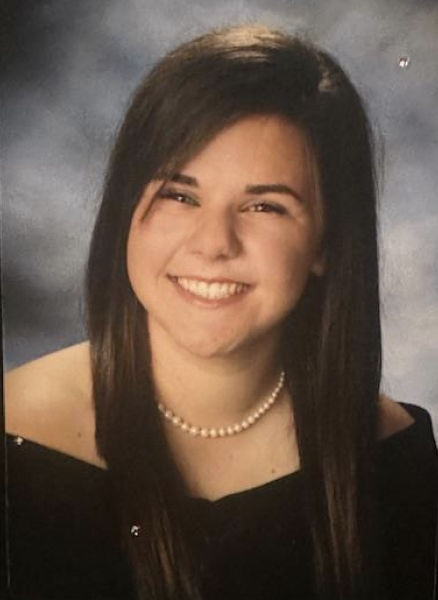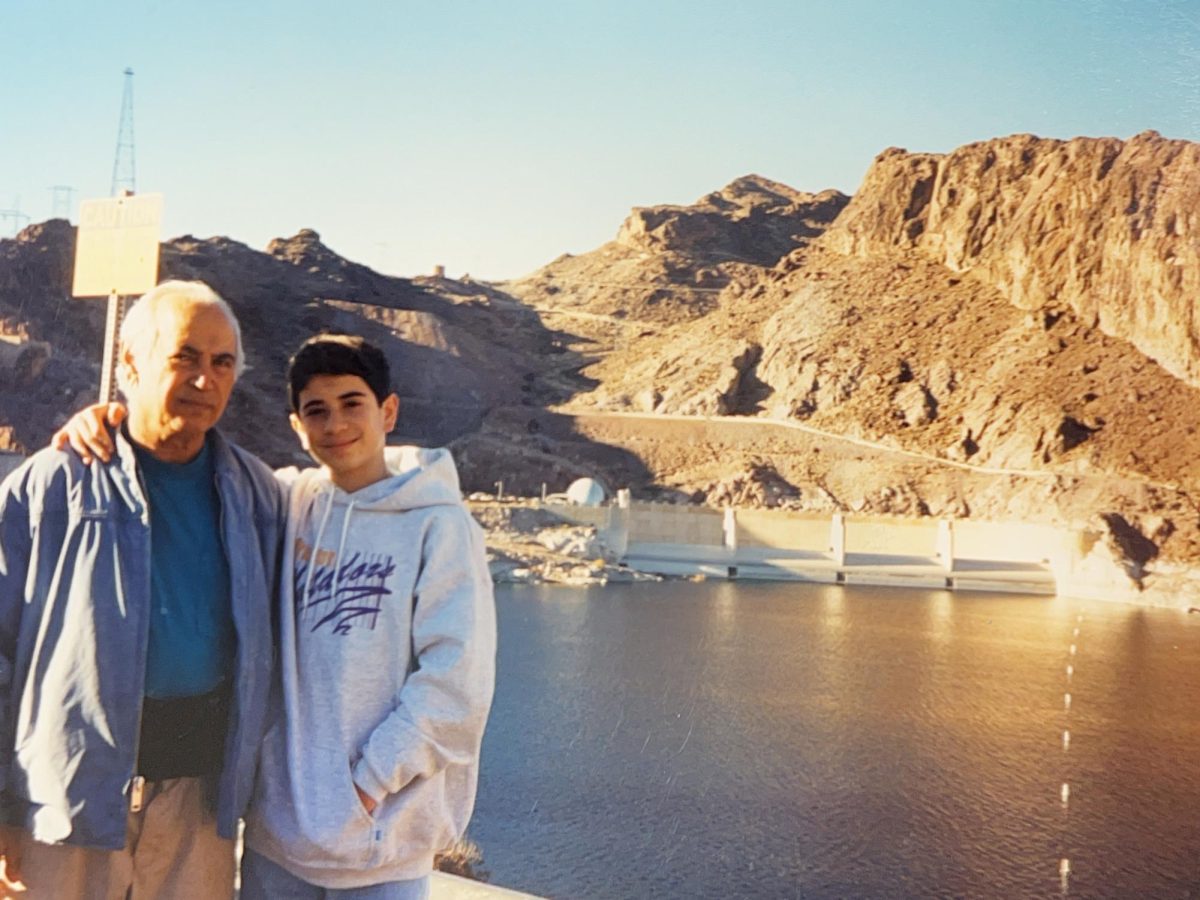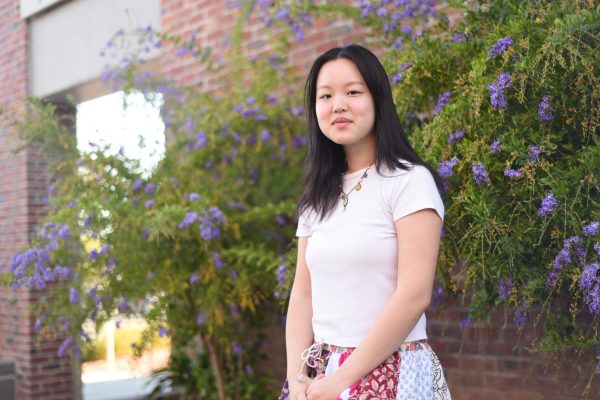Pooya Hajjarian: Class of 1997
Biology and Health teacher Pooya Hajjarian was in the seventh grade when he and his family immigrated from Iran to America. Hajjarian’s family settled in Cupertino and he eventually attended MVHS where he recalls feeling isolated from his American peers because of his unique background. Having experienced difficulty in finding a place within the MVHS community, Hajjarian strives to create an environment in his classroom where students of different backgrounds feel welcome.
“I felt invisible as a student,” Hajjarian said. “I felt like a lot of the times in my classes I may have just been seen as the immigrant kid who isn’t caught up yet. I don’t want that for my students. I want to push them and I want them to know that they can do those things.”
From his time as an MVHS student, Hajjarian feels he is able to empathize with the needs of his students. Having experienced low confidence and motivation academically from a lack of support, Hajjarian recognizes the importance of building a class structure that prioritizes connecting with his students in a way that helps them grow as people.
“Community building has to be a huge part of what we do as teachers,” Hajjarian said. “I like making things digestible for my students and not just being like, ‘I’m going to throw a lot of rigor at you and you have got to deal with it.’ It’s a lot of scaffolding and human to human connections. I know that when you build more connections with students, they are naturally going to try more in their classes.”
After graduating from MVHS in 1997, Hajjarian decided to pursue a college education at UCSC, stating that its close proximity to Cupertino allowed him to stay near his family. As Hajjarian finished his time at UCSC as a Biology major, he began considering becoming a teacher. In particular, Hajjarian felt drawn to return to MVHS to be able to help high school students in situations similar to his own high school experience.
“Being here allows me to feel like I’m helping my 14-year-old self,” Hajjarian said. “I want to be a teacher who I would have needed when I was in high school. I think having been a student has really allowed me to want to support the students in a way that I could have used that support when I sit on the opposite side now as a teacher.”
Ashley Voigt: Class of 2009
Guidance Counselor Ashley Voigt’s experience as an MVHS student was tinged with the feeling of academic competition within the school community. From a staff perspective, Voigt continues to see a prominent culture of competition at MVHS and says it has been heightened as the pressure to be admitted into college and pervasive use of social media has elicited frequent self-comparison among students. Though she remembers being less affected by the pressure compared to many of her peers, her personal perspective has translated into the way she provides guidance to MVHS students.

“I felt kind of inadequate at times because I definitely knew I wasn’t at a level that other students were at and that took a toll on me at times,” Voigt said. “To be a counselor at the high school I went to and knowing the academic pressure definitely shifts my perspective. Sometimes I use my story to connect with students so that they hopefully feel more understood, more heard and more validated that I do come from this school and I do remember what it was like to feel some of that pressure.”
After graduating from MVHS in 2009, Voigt felt pressured by the expectation to obtain a four-year college education. Despite not feeling personally drawn to it, Voigt pursued a university education but eventually returned to Cupertino to study at West Valley Community College (WVCC) instead, where she says she thrived. Having a more mature understanding of her goals and abilities, Voigt now sees the importance of prioritizing oneself over societal expectations and peer pressure and emphasizes these concepts to her students.
“Having that experience, I realized now that as an adult, nobody cares where you went to college or what you got on your SATs,” Voigt said. “It feels so important in high school but then in the real world, once you get past all of that, it really isn’t. My main message that I share is that, at the end of the day, you are the person that you should be concerned about and the work that you do, as long as it is your very best, that is what matters.”
After two years at WVCC and later transferring to San Jose State University to finish her bachelor’s degree in Psychology and master’s degree in Counseling, Voigt was prompted to return to MVHS as a counselor because of her personal experience with academic pressure at MVHS, and strives to help her students recognize their potential amid an environment where they may feel diminished.
“I can relate to what the pressure felt like sometimes, and I imagine it’s even higher for some students compared to what I experienced,” Voigt said. “When I was in high school it was hard for me to ignore it because it’s everywhere. But if you aren’t doing what you need to do for yourself and what is within your own bandwidth, you’re really striving to be somebody else and I don’t feel like that is my hope for my students. I help them focus on their strengths, their attributes and make sure that they feel confident, which I know is not easy. But just sending that message and recognizing that there is a lot of pressure.”
Derek Lu: Class of 2009
Growing up with an affinity for the humanities, English teacher Derek Lu recalls feeling a looming burden to excel in the STEM field during his time at Lynbrook High School. At school, Lu witnessed his peers approach humanities classes with the only priority of maintaining grades, rather than being motivated to learn. Impacted by an environment that made him feel inferior academically for not having a strong STEM focus, Lu felt compelled to teach at MVHS where he hopes to challenge this culture.
“I always felt like I couldn’t measure up to my peers and to my friends because I wasn’t ‘that STEM inclined kid,’” Lu said. “I was always a kid who loved reading and writing growing up and I didn’t have the outlet or the resources to pursue those interests at Lynbrook. I’m more conscious of everything that a teacher has to go through. I’m also more conscious of just moving away from the impulse at Monta Vista to prioritize rigor. I don’t really believe that that should be the measure of how students engage with content.”
While Lu sees STEM as a field many Asian Americans strongly embrace, he says he did not feel the same acceptance of Asian Americans in the humanities, specifically due to the lack of representation in his English classes. Lu recalls only ever studying the works of white authors, feeling as though his Asian American and queer identities were not reflected in a class that was important to him. From this experience, he stresses the importance of providing students with literature that represents them.
“The material was not reflective of the scope and the breadth of American literature,” Lu said. “These days, we would recognize it as blatantly racist to not have a single Black author on your curriculum, it’s completely erasing the contributions of authors of color. The priority is to help students see themselves in the stories that they read in class.”
As the MVHS student body is predominantly Asian American, Lu pushes for incorporating AAPI stories and history in the English classes at MVHS so that students can interact with content they can directly connect to. One of the ways Lu works toward this inclusion is by helping plan and facilitate an AAPI Experiences in Literature Professional Development for English teachers across the district. The three sessions inform teachers about commonly overlooked Asian American history with a sociological and ethnic studies approach. As an Asian American himself, Lu hopes to help his students reach their potential in humanities as well.
“Both my racial identity and my sexual orientation is very much embodied in how I approach teaching English,” Lu said. “My impetus for wanting to be an English teacher in this district specifically is because I wanted to be the type of role model that I never had growing up. Seeing an English teacher who looks like you was something that I wanted to be for my kids and not reinforce the idea that English is a subject that only white people pursue.”










